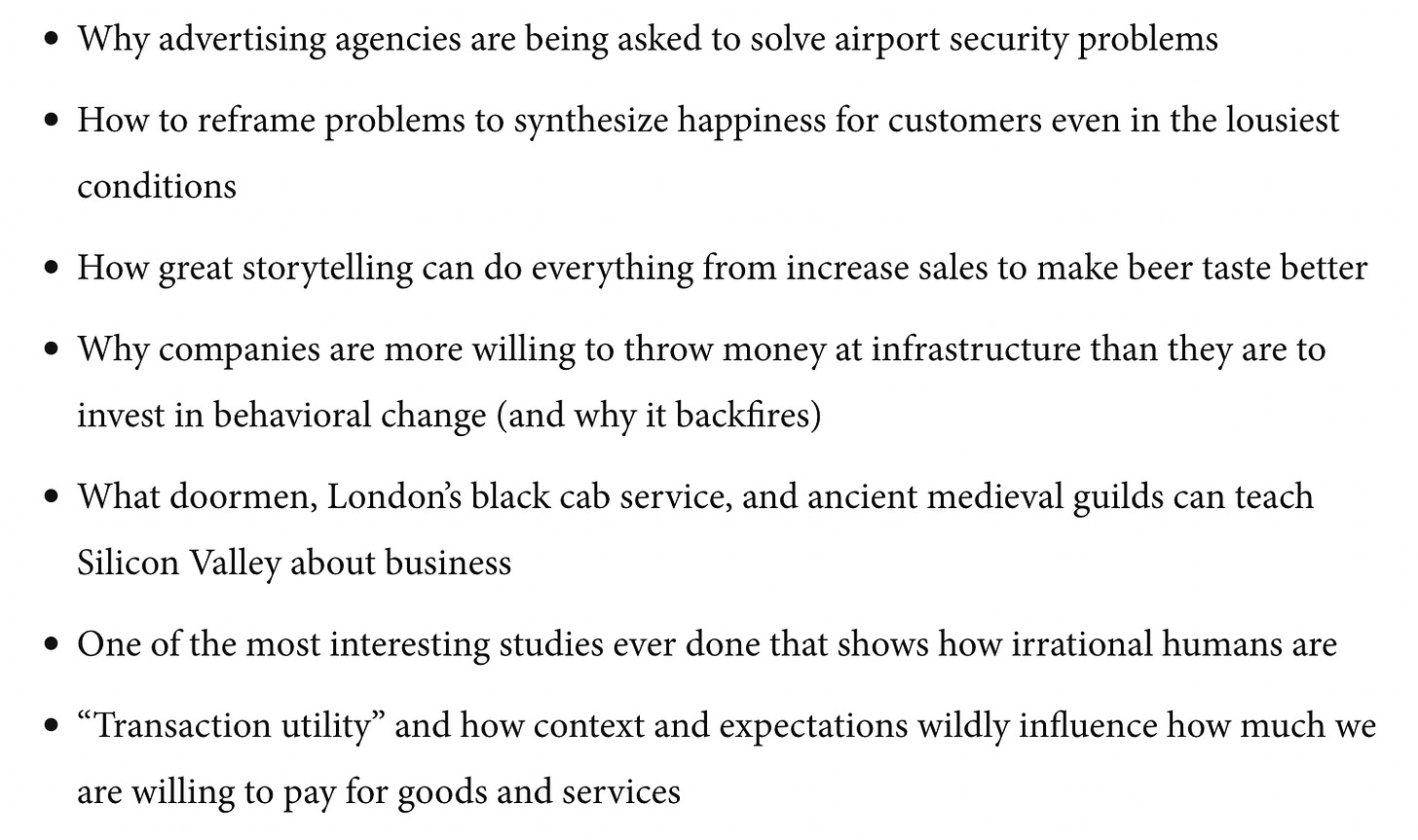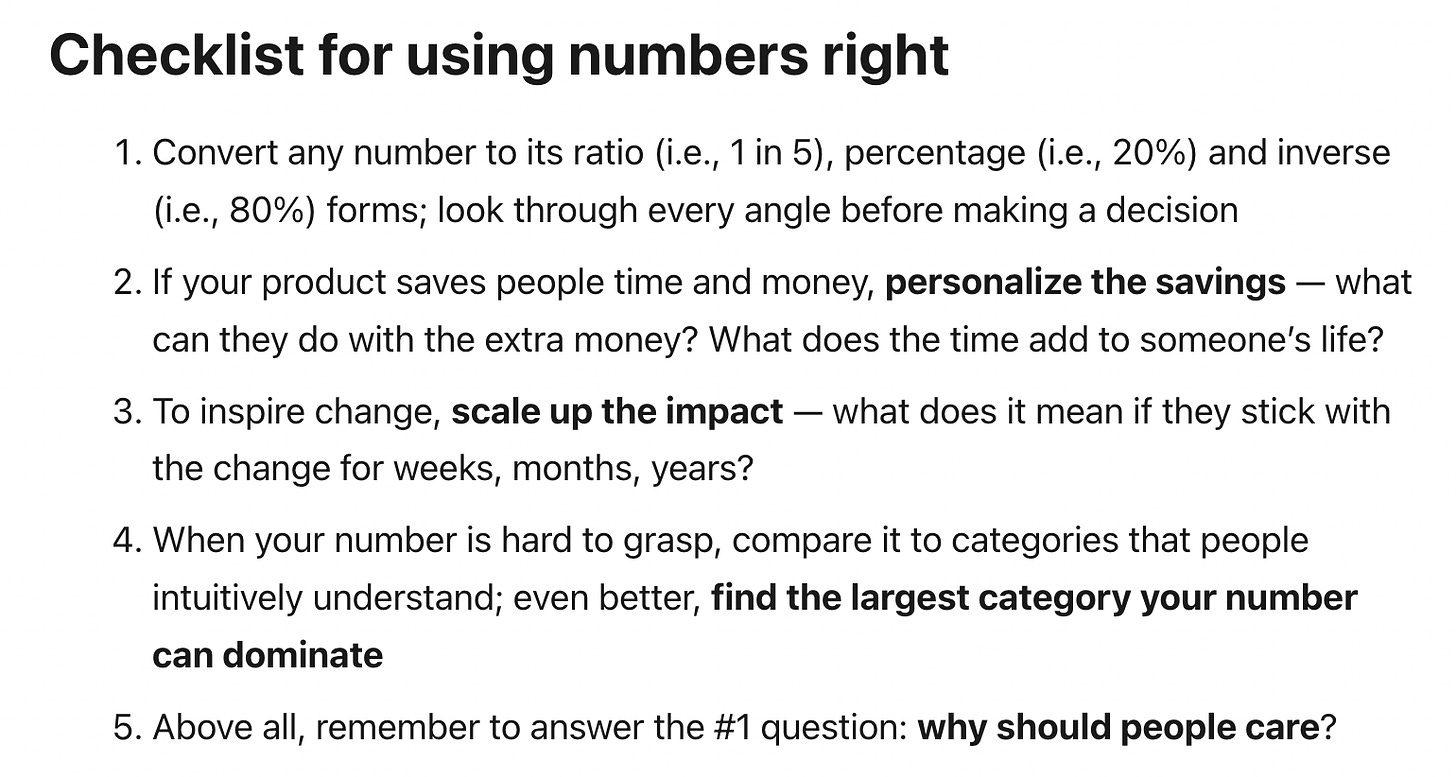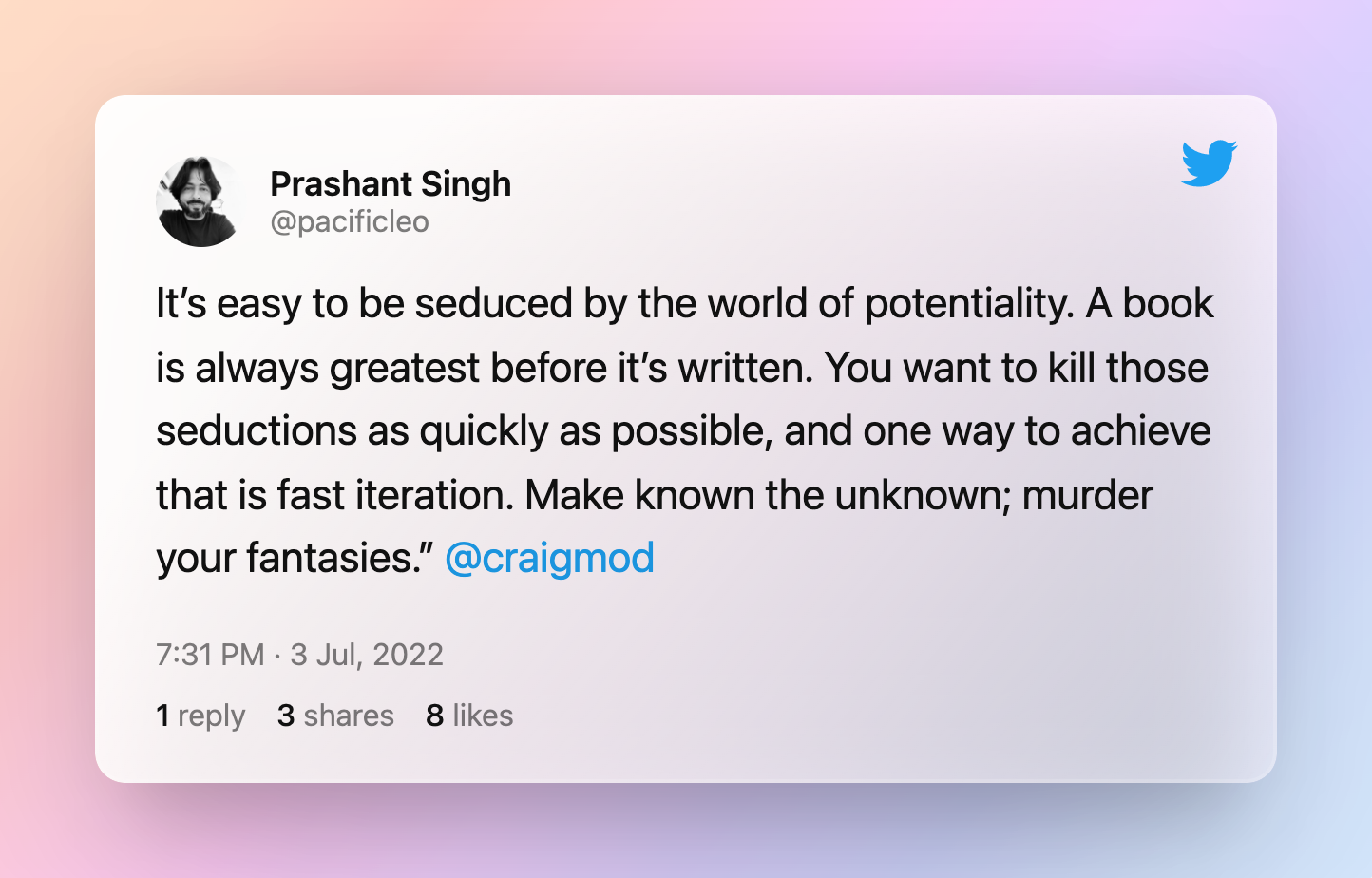#61 A flower is a weed with an advertising budget
Ideas from Rory Sutherland, Vitalik Buterin and more
I came across this piece of financial advice in James Clear’s 3-2-1 newsletter.
"When you buy something cheap and bad, the best you’re going to feel about it is when you buy it. When you buy something expensive and good, the worst you’re going to feel about it is when you buy it.”
These golden words are from Sasha Aickin’s grandmother. Chasing the source led me to Sasha’s Redfin blog and ultimately to this really interesting piece on “Merchant Sensibility”. The blog post goes on to define this term as follows:
In its classic sense, merchant sensibility is the ability for someone to guess which of two similar products a small store should stock. “You still measure whether the product the guy chose actually sells better,” Marc once explained to me, “But someone with merchant sensibility gets it right more often than other people.”
Post’s author Glenn Kelman argues that this approach has some inherent benefit. However it gets lost behind the charm of number crunching as the business scale. He has an interesting observation against number crunching.
But running the numbers has two shortcomings:
It isn’t actually an action. It’s a study, which will take weeks to complete, which may or may not result in a decision. Especially as a business grows, you need a bias for action.
It encourages learned helplessness: the person running that business isn’t the number-cruncher. So now you have two people screwing in a light-bulb instead of one, and less accountability.
That’s a lot of wisdom in just an opening act. Time to get to the rest of the post.
1. Rory Sutherland in Knowledge Project Podcast
If I have to give only one recommendation to you this week, I will say listen to this podcast episode from The Knowledge Project. Shane Parrish hosts Rory Sutherland and they discuss the “Psychology of Advertising.” It’s a two hour long chat, covers tons of topics and even then you will be left wanting more.
I’m yet to create my takeaway notes from the conversation (and I am guaranteed to spend many more hours listening to it again and taking those). Still, that could not stop me from sharing it here today and making it the must-listen recommendation.
Here’s a brief snapshot from the fs.blog about the key things that were discussed in this Podcast.
Thanks Rout for recommending checking Rory’s work. I picked up Alchemy over the weekend. Looking forward to reading it.
2. Craft your imagination with Townscaper
Townscaper is a procedural town-building toy. It’s a city builder game without any clearly specified goal or levels. You can simply add or remove a block from the game world, and you can customize the colour of the block. That’s it. And with these limited interactions you craft your world.
You have to try it to experience it. Or check out some videos on youtube about the things its ‘players’ have created. From idyllic seaside towns to a horizon spanning metropolis - the imaginations can run wild and the game is well designed to let it happen that way.
Source: Instagram
If you want to nerd a little, you can check out this blog covering how the game is designed and the technology powering it. It gets technical, but if you can keep some patience you will start appreciating the details. Fascinating stuff!
3. Tips for better life
I like reading a certain kind of listicles. They are generally focused on imparting life’s wisdom in simple words. And So, 100 tips for a better life became an easy choice to read and (now) recommend to you. Here’re my 5 favourites from the post.
“Where is the good knife?” If you’re looking for your good X, you have bad Xs. Throw those out.
Keep your desk and workspace bare. Treat every object as an imposition upon your attention, because it is. A workspace is not a place for storing things. It is a place for accomplishing things.
Discipline is superior to motivation. The former can be trained, the latter is fleeting. You won’t be able to accomplish great things if you’re only relying on motivation.
You do not live in a video game. There are no pop-up warnings if you’re about to do something foolish, or if you’ve been going in the wrong direction for too long. You have to create your own warnings.
If something surprises you again and again, stop being surprised.
4. Storytelling with numbers
In “We're using numbers wrong” Linda talks about how to turn cold stats into convincing stories. She has relatable and simple examples to explain her recommendations. It’s fun to read and can lead to some creative spark next time you’re talking your numbers.
For a quick takeaway, here’s a quick snapshot from the post:
5. #TIL
I heard about a bunch of new terms in recent times, sharing some of the interesting ones here:
In finance, the greater fool theory suggests that one can sometimes make money through the purchase of overvalued assets — items with a purchase price drastically exceeding the intrinsic value — if those assets can later be resold at an even higher price.
In this context, one "fool" might pay for an overpriced asset, hoping that he can sell it to an even "greater fool" and make a profit. This only works as long as there are enough new "greater fools" willing to pay higher and higher prices for the asset. Eventually, investors can no longer deny that the price is out of touch with reality, at which point a sell-off can cause the price to drop significantly until it is closer to its fair value, which in some cases could be zero. [Source]
Goldilocks zone refers to the habitable zone around a star where the temperature is just right - not too hot and not too cold - for liquid water to exist on a planet. Liquid water is essential for life as we know it. Where we find liquid water on Earth we also find life. [Source]
6. Vitalik Buterin’s packing guide
Vitalik Buterin’s 40-liter backpack travel guide is a must read. He has gone into nerd-level details to explain his travel packing rituals. There is a reason for almost everything in his possession. His approach to arrive at these gives a good glimpse into his mind & thinking process. For most of us, these things are fairly trivial, and so we end up spending time & energy on them every day. Vitalik is not like us, though. He has invested time & energy to arrive at the most optimal & preferred solution for himself. This saves him all the hassle in all subsequent moments of using them.
I found this article in STOA’s newsletter. I recently discovered them and have found their posts enjoyable everyday. I highly recommend subscribing to them. Read this one and you will know why I say that.
7. Everything else
Some random goodness from the internet:
Follow: Cookalore (@cookalore) by Priya Mani is a visual encyclopedia of Indian food.
Watch: Realistic Lego Man (almost) - these crafting efforts are so interesting to watch in your free time, there is more in this youtube channel.
Read: Oneteen and Twoteen (or 11 and 12 as we more popularly know them today), Watch that came in from the cold (this can be a Netflix documentary, just saying), 23 impossible-to-find items that your camper must bring tomorrow (story of every conversation with our kids’ school these days), Giuseppe Arcimboldo's genius (he lived in 16th century but did art that’s more trendy in this Instagram age)
Interact: Just because you read a New York Times headline about a study doesn’t mean that its findings are replicable, so stay curious. Try this fun activity if you don’t believe me.
Before we sign off, here’s a quick dose of learning from Twitter.
That's all for this week, folks!
If you enjoyed this post, show your love by commenting and liking it. I write this newsletter to share what I learnt from others. If you learnt something from this today, why not share it with a couple of your friends to continue this chain?








Your issues get meatier every week. I've to set aside a time for this. Maybe that's something showrunners figured out years back when they created the breakfast program category or inserted coffee in the title.
The merchant sensibility post was a gem. That "you need data and first-hand experience" is obvious but often gets lost as we optimize for one over the other at different levels of scale. Sometimes, what counts cannot be counted, and what can be counted doesn't count.
I have thought of what makes founders and leaders better storytellers. My best guess is clarity. Word by word, they're not necessarily better storytellers. But they can distil something vast like a business into a label or a phrase that captures the essence of it. Most recent case in point is the use of 'lemonade-stander'. It evokes emotion, is a very visual label, and sticks.
What I've learned from Rory is to look for things where perceived value > objective value. For example, a bridge only has objective value. No cares about how it looks or how it makes you feel. But anything that involves human interaction like a library or a train or phone is or should be measured y its perceived value.